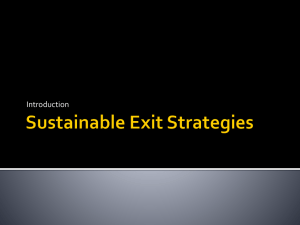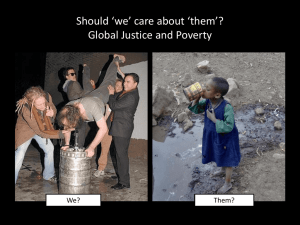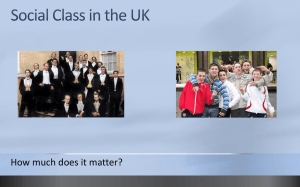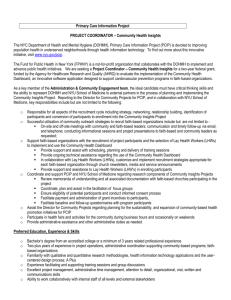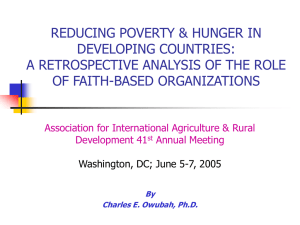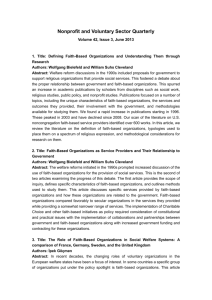file
advertisement
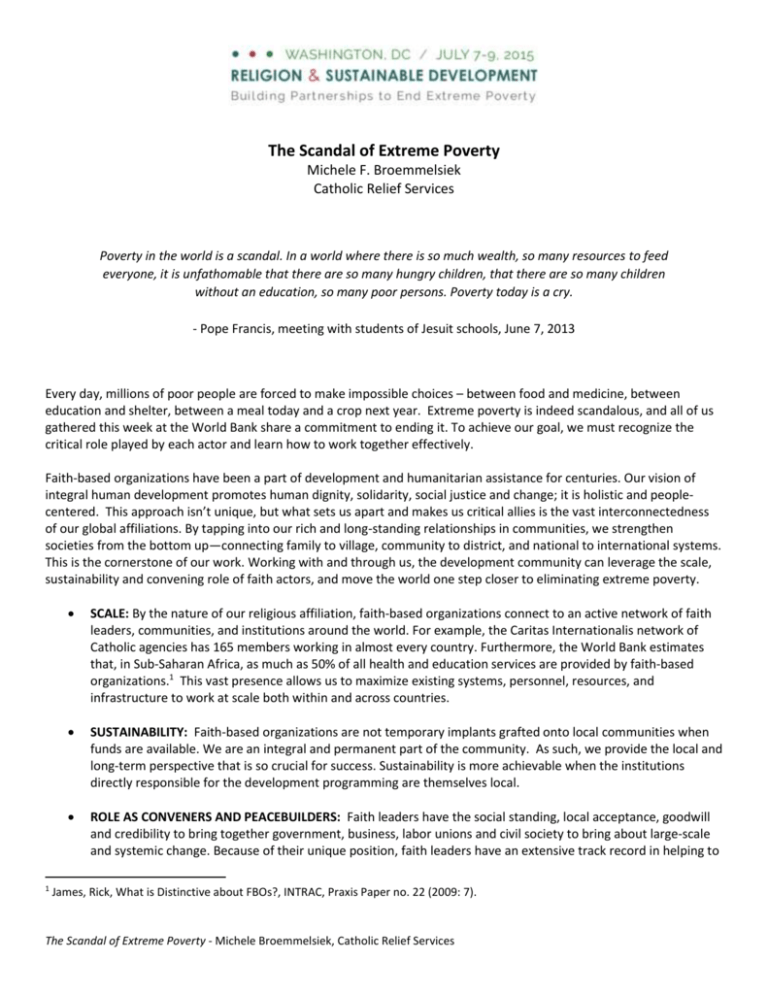
The Scandal of Extreme Poverty Michele F. Broemmelsiek Catholic Relief Services Poverty in the world is a scandal. In a world where there is so much wealth, so many resources to feed everyone, it is unfathomable that there are so many hungry children, that there are so many children without an education, so many poor persons. Poverty today is a cry. - Pope Francis, meeting with students of Jesuit schools, June 7, 2013 Every day, millions of poor people are forced to make impossible choices – between food and medicine, between education and shelter, between a meal today and a crop next year. Extreme poverty is indeed scandalous, and all of us gathered this week at the World Bank share a commitment to ending it. To achieve our goal, we must recognize the critical role played by each actor and learn how to work together effectively. Faith-based organizations have been a part of development and humanitarian assistance for centuries. Our vision of integral human development promotes human dignity, solidarity, social justice and change; it is holistic and peoplecentered. This approach isn’t unique, but what sets us apart and makes us critical allies is the vast interconnectedness of our global affiliations. By tapping into our rich and long-standing relationships in communities, we strengthen societies from the bottom up—connecting family to village, community to district, and national to international systems. This is the cornerstone of our work. Working with and through us, the development community can leverage the scale, sustainability and convening role of faith actors, and move the world one step closer to eliminating extreme poverty. 1 SCALE: By the nature of our religious affiliation, faith-based organizations connect to an active network of faith leaders, communities, and institutions around the world. For example, the Caritas Internationalis network of Catholic agencies has 165 members working in almost every country. Furthermore, the World Bank estimates that, in Sub-Saharan Africa, as much as 50% of all health and education services are provided by faith-based organizations.1 This vast presence allows us to maximize existing systems, personnel, resources, and infrastructure to work at scale both within and across countries. SUSTAINABILITY: Faith-based organizations are not temporary implants grafted onto local communities when funds are available. We are an integral and permanent part of the community. As such, we provide the local and long-term perspective that is so crucial for success. Sustainability is more achievable when the institutions directly responsible for the development programming are themselves local. ROLE AS CONVENERS AND PEACEBUILDERS: Faith leaders have the social standing, local acceptance, goodwill and credibility to bring together government, business, labor unions and civil society to bring about large-scale and systemic change. Because of their unique position, faith leaders have an extensive track record in helping to James, Rick, What is Distinctive about FBOs?, INTRAC, Praxis Paper no. 22 (2009: 7). The Scandal of Extreme Poverty - Michele Broemmelsiek, Catholic Relief Services create peaceful and just societies, working with the authority that springs from the trust the community holds in them. The challenge for all of us is to find a way to bring our strengths together to end extreme poverty. There are many ways the development community can help faith actors reach their potential as full development partners. The two most important ones are to: SUPPORT ORGANIZATIONAL CAPABILITIES: Institutions evolve, become more vibrant, and withstand the test of time by what they learn and share. Through capacity strengthening and accompaniment, the international community can help faith-based organizations create the structures and systems that will enable them to manage larger and more complex programs. CREATE AND MAINTAIN SPACE: The international community must carve out welcoming space for all stakeholders to collaborate together. Specifically we need to encourage broad participation by faith-based organizations and civil society in the creation of national development agendas. Our discussion this week proves that we have the interest, goodwill and opportunity to confront and eliminate extreme poverty. We have a powerful call to action – and to act now. A way has to be found to enable everyone to benefit from the fruits of the earth, and not simply to close the gap between the affluent and those who must be satisfied with the crumbs falling from the table, but above all to satisfy the demands of justice, fairness and respect for every human being. - Pope Francis, Address to the Food and Agricultural Organization, June 20, 2013 The Scandal of Extreme Poverty - Michele Broemmelsiek, Catholic Relief Services
